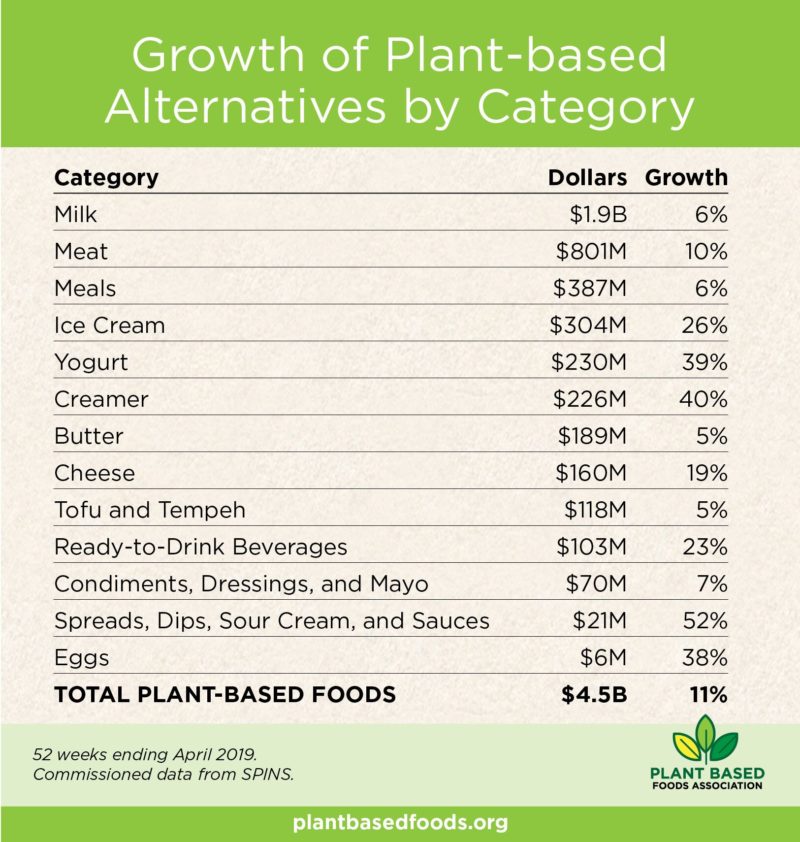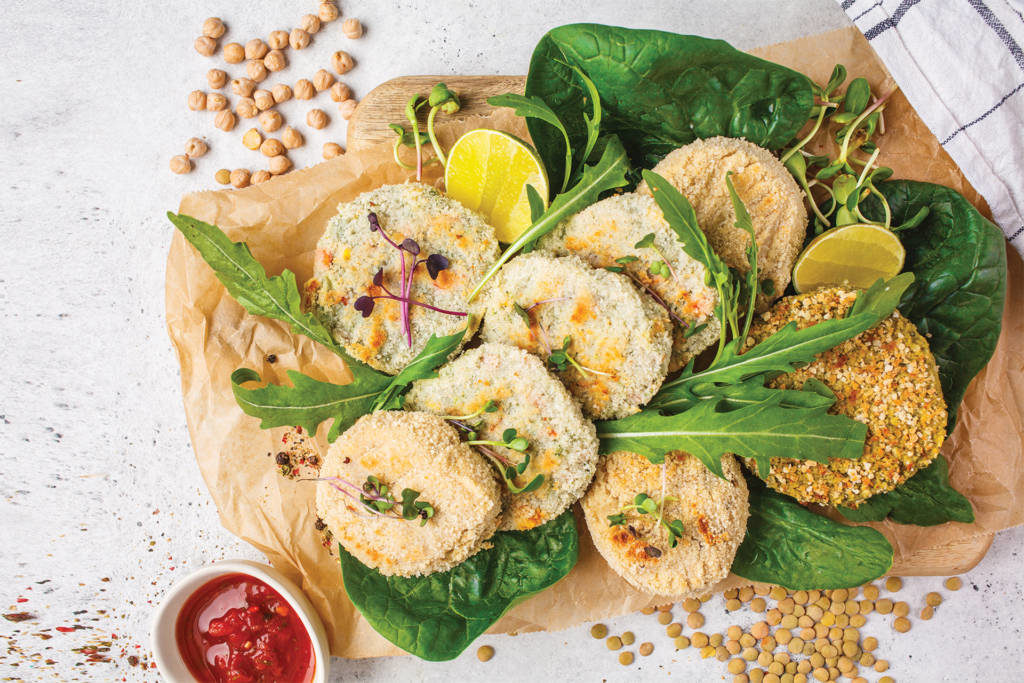The most lucrative plant-based alternatives were milk alts and meat alts—with milk winning by a mile, raking in $1.9 billion compared to meat’s $801 million. Jon Peters, President of Beneo, Inc., says that on the supplier end, Beneo is seeing the same thing: “Worldwide we see a growing demand for ingredients that support the development of meat-free alternatives… This trend is reflected in the requests for Beneo’s functional proteins worldwide. Dairy alternatives are becoming more and more commonplace as well.”

People are looking for alternatives to meat and dairy for any number of reasons: health, allergies, intolerances, animal rights, ethics. Regardless of other motivating factors, though, people are looking for taste: The NPD Group released a study in November regarding the consumption of plant-based foods (2). To quote Darren Seifer, NPD Food and Beverage Industry Analyst: “First and foremost taste is king… Attributes such as health and convenience go far to drive consumption, but if the flavor profile falls below consumers’ expectations, then the product will likely have a short run.”
From the current state of the market, it seems taste is meeting consumer expectations, with people looking for plant-based options in places that aren’t traditionally known for their healthy offerings. Dunkin’ now sells Beyond Meat breakfast sandwiches (Beyond Meat is made with proteins from pea, mung bean, fava bean, brown rice, and sunflower, and fats from cocoa butter, coconut oil, sunflower oil, and canola oil), and for a limited time (as of publication), select McDonald’s restaurants in Southwestern Ontario, Canada, are selling Beyond Meat plant burgers. Grubhub released its annual Year in Food report back in December: The top order was cauliflower pizza. Portobello empanadas, black bean & sweet potato tacos, vegan pad thai, and the Impossible Burger also made it into the top 10 orders (3).
11 standout ingredients
Fortunately for your customers, there is nearly endless innovation, and a variety of brands for them to enjoy. It’s important, obviously, to take into account what’s actually selling for you and how much space you have—but plant-based is booming, and you may want to expand your offerings. Here’s a sampling of what’s happening in this space:Bananas: Those allergic to nuts and soy may be excited to see Bananamilk on the shelf. Mooala offers a milk made with pureed bananas, sunflower seeds, and a dash of cinnamon and salt, giving extra flavor to coffee and smoothies. It’s gluten-free, dairy-free, vegan, and organic, giving it wide appeal.
Chicory root fiber: According to Peters, consumers are seeking out products containing this ingredient—“It’s natural and plant-based, and it’s being recognized for its prebiotic properties.” It also provides a smooth texture, and can reduce fat in both meat- and dairy-alts, he says.
Coconut: Those looking for a plant-based yogurt can count on coconut. Offerings from Lavva are made mainly with coconut water and coconut cream—along with plantains, pili nuts, and a few other ingredients—Lavva yogurt contains prebiotics, 50 billion probiotics, and no added sugar. Elizabeth Fisher, Founder of Lavva, told WholeFoods at Expo East that Lavva doesn’t use any stabilizers or fillers—not, she said, because that’s easy, but because she “didn’t know any better.” Thus: clean-label coconut yogurt with real fruit. (Fun fact for the nut-allergic: Coconuts aren’t nuts—they’re drupes, according to the Coconut Coalition of the Americas.)
Those looking for an ice cream fix can try Coconut Bliss’s frozen dessert, available in just about any flavor: There’s your Coffee and Cookie Dough, but there’s also Raspberry Açaí, Ginger Cookie Caramel, and Walnut Brownie. Coconut Bliss also comes in bars and cookie sandwiches—and those cookies are made with sprouted flours and hemp seeds.
And popping out of dairy and into meat: The popularity of jerky as a protein-boosting on-the-go snack means that vegan options will be important to the plant-based consumer. Coconut, while perhaps best known for its use as a dairy-alt, works here as a meat-alt too: Foreal Foods makes coconut jerky, in flavors from Original to Ginger Teriyaki.
Hemp: Hemp milk is a great starting place for those who have heard the hemp buzz and want to try it out. A few brands to consider: Tempt makes hemp milk, and has for years; Elmhurst recently debuted a hemp milk; and Pacific Foods makes hemp milk, noting on their site that hemp milk is a “great source of plant-based nutrition, including omega-3s.”
Jackfruit: Upton’s Naturals notes on their site that Jackfruit is the largest tree-borne fruit in the world, capable of yielding a variety of different textures and flavors. Upton’s Naturals uses it to create products like Thai Curry Jackfruit and Sweet and Smoky Jackfruit, ideal for salads, sandwiches, rice, and tacos.
Getting back to jerky, Snack Jack makes jackfruit jerky. Three flavors, including Hickory Smoked and Sweet Chili, and all vegan, paleo, keto, soy-free, gluten-free…and more. Snack Jack’s website, SnackJackJerky.com, lauds the perks of jackfruit: It’s a “nutrient-dense superfood that… contains almost every vitamin and mineral we need, fiber, and protein!” And that fiber is prebiotic, making it ideal for those looking to boost their gut health.
Gluten Check
The unsung hero of many meat-alts is wheat gluten. It helps hold the product together, which is particularly important in products imitating ground meat—burgers, sausage, and so on. Wheat in general, even if not used for its glutinous properties, is growing: “In 2019, wheat protein grew to become the most-used plant-based protein in new meat alternative product launches,” Peters says, citing Mintel. For your customers who aren’t worried about gluten, this is no biggie, but for your gluten-free customers, it places a bunch of vegan products off-limits. Consider marking which products are gluten-free, or even merchandising products based on whether or not they’re certified gluten-free. If you have a big gluten-free customer base, consider adding a special section in your circular denoting gluten-free, plant-based options, to make life easier for these customers.Mushrooms: These fungi aren’t just trending as supplements; they’re also an exciting form of jerky. Jewels of the Forest makes Shroom Snacks—oyster mushroom jerky in Sesame and Chili flavors. Oyster mushrooms, the company notes on their website ShroomJerky.com, are full of vitamin D and antioxidants. For those trying to convert from meat to plant-based, consider stocking Pan’s: Their jerky is made with shiitake mushrooms, with a meaty texture and umami flavor.Nut milks, beyond almonds: Elmhurst is expanding the nut milk space, selling cashew milk, walnut milk, and hazelnut milk, all Non-GMO Project Verified, vegan, kosher, and dairy free. These nuts have their own benefits: Walnut milk contains 1,400mg omega-3 ALA per serving; the cashew milk, according to reviewers, is ideal for use in cappuccinos; and the hazelnut milk is, reviewers say, ideal for just about any vegan dessert. Milkadamia makes Macadamia Milk, too, for those looking for a keto dairy replacement.
Oats: Oatmilk, being dairy-free, nut-free, gluten-free, soy-free, and vegan, hits all the right notes. And, yes, it’s great for baking: Planet Oat has bunches of recipes on their website, PlanetOat.com, ranging from Butternut Squash, Kale, and Bacon Mac and Cheese to Dark Chocolate Chia Pudding.
And oats aren’t stopping at milk. Oatly sells frozen desserts in a range of flavors—chocolate chip, coffee, strawberry. And take a look at Hälsa, a clean-label, no-sugar-added oat-yogurt brand. Their products come in an 8oz drinkable format, perfect for those on-the-go customers; those looking to sit down for a snack might be happy with the 5.3oz cups.
Seitan: According to Upton’s Naturals, Seitan is a traditional Japanese food made by rinsing the starch away from wheat and retaining the protein, creating a high-protein, low-fat product with a meat-like texture. Upton’s uses it to create burgers, Ground Seitan, and Bacon Seitan, to name a few.
Soy: Soy, like coconut, performs double-duty, as both a dairy-alt and a meat-alt. Dairy, of course, you know; but as a meat-alt, it works hard. MorningStar Farms notes that there are benefits to soy: their Original Sausage Patties, for instance, have 81% less fat than cooked pork sausage—ideal for those looking to cut down on fat, or looking to get their fats in other places.
Soy also works as—wait for it—jerky: The brand It’s Jerky Y’all uses non-GMO soybeans to make jerky in three flavors, including Prickly Pear Chipotle and Black Pepper & Sea Salt. The recipes on their website, ItsJerkyYall.com, suggest that their jerky works in salads, spring rolls, and pizza.
Veggies: How could we overlook the original vegetarian burgers? Sweet Earth Foods makes burgers for those looking to go back to basics, with black beans, sweet potatoes, and chili peppers starring in options like their Teriyaki Veggie Burger and their Santa Fe Veggie Burger. And while pea protein shows up more in protein powders, it’s got its fans in the meat-alt world, too: Sweet Earth’s Awesome Burger is made with pea protein, and their Mediterranean Veggie Burger features green peas.
Looking ahead
As to where plant-based is going: pretty much everywhere. The Plant Based Foods Association partnered with Kroger to find out what happens when plant-based meat alts are sold in the conventional meat department; the 16-week study, which began on December 9, is about half over. WholeFoods Magazine will report on that when the results come out—the plant-based dairy alt market changed forever when almond milk made its way into the conventional dairy case, and we’re looking forward to telling you what happens when plant-based meat makes the same shift (4).That said, it’s not all good news. As we reported back in October, the House of Representatives is looking at the Real Marketing Edible Artificials Truthfully (MEAT) Act, which will codify the definition of beef for labeling purposes with the intent of preventing plant-based products from being labeled as “meat” (5). Dan Colegrove, a lobbyist for PBFA, testified that “Our member companies already use qualifying terms on their product labels… to make things clear to consumers. Plant-based foods have been in the marketplace for more than 30 years using terms that are clearly understood.” Even if this bill fails, there are bills being introduced on the state level. Labeling changes may be in the future; we’ll keep you updated, so that you can keep your customers educated regarding any new terminology. WFReferences
- WholeFoods Magazine Staff, “Plant-Based Food Retail Sales Grew 11% This Past Year,” WholeFoods Magazine. Posted 07/19/19. Accessed 1/1/20. https://wholefoodsmagazine.com/grocery/news-grocery/plant-based-food-retail-sales-grew-11-this-past-year/
- WholeFoods Magazine Staff, “Plant-based: Passing fad, or wave of the future?” WholeFoods Magazine. Posted 11/6/19. Accessed 1/1/20. https://wholefoodsmagazine.com/news/main-news/plant-based-passing-fad-or-wave-of-the-future/
- WholeFoods Magazine Staff, “Grubhub Releases ‘Year in Food’ Report, Top Trends,” WholeFoods Magazine. Posted 12/5/19. Accessed 1/1/20. https://wholefoodsmagazine.com/grocery/news-grocery/grubhub-releases-year-in-food-report-top-trends/
- WholeFoods Magazine Staff, “7 Trends from Natural Products Expo East,” WholeFoods Magazine. Posted 9/13/19. Accessed 1/1/20. https://wholefoodsmagazine.com/grocery/news-grocery/7-grocery-trends-from-natural-products-expo-east/
- WholeFoods Magazine Staff, “Bill Introduced to Prevent Plant-Based Products Being Labeled as Meat,” WholeFoods Magazine. Posted 10/31/19. Accessed 1/1/20. https://wholefoodsmagazine.com/grocery/news-grocery/bill-introduced-to-prevent-plant-based-products-being-labeled-as-meat/









